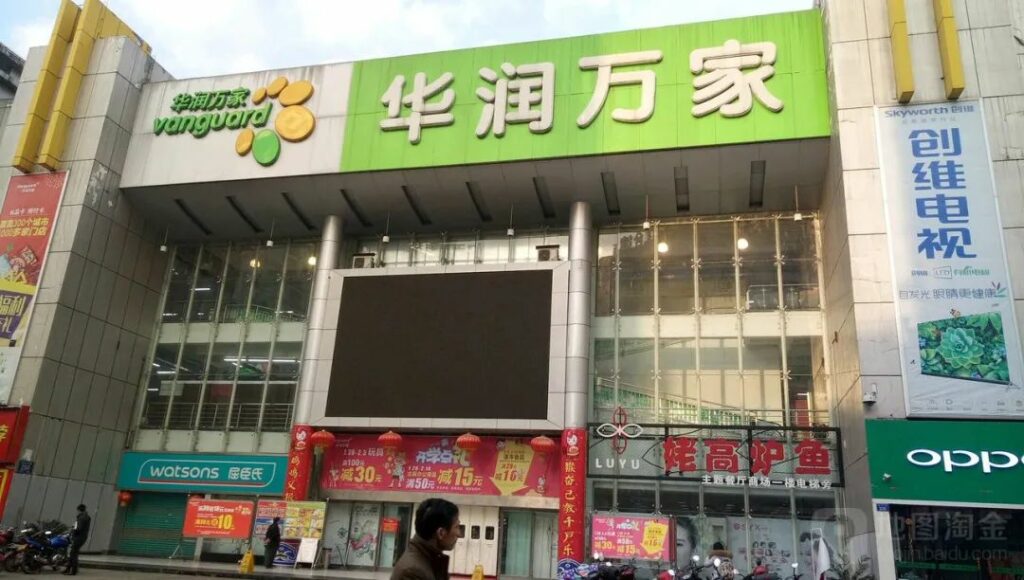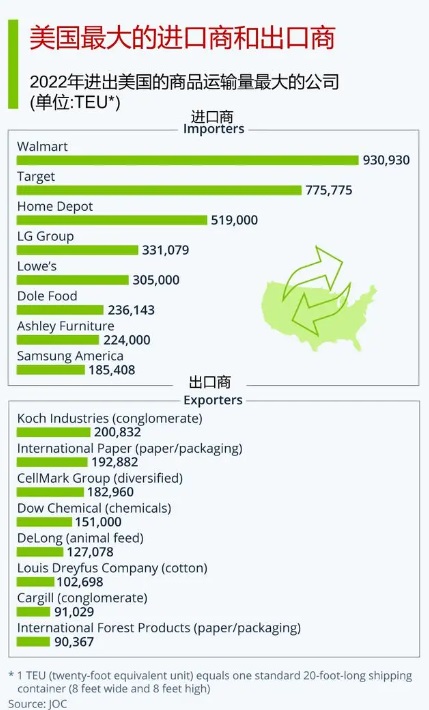In 2024, Supermarkets in China present a fascinating tapestry of diversity and innovation, reflecting the dynamic nature of the country’s consumer market. These establishments range from sprawling hypermarkets to intimate boutique stores, each offering a unique shopping experience.
Need a cost effective TP (Tmall Partner) to sell in China?
We are an Official Tmall Partner e-commerce Agency. Our Services: E-Commerce, Search Engine Optimization, Advertising, Weibo, WeChat, WeChat Store & PR.
List of 20 Top Supermarket in China
- WUMART (物美)
- Yonghui Supermarket (永辉超市)
- RT-Mart (大润发)
- China Resources Vanguard (华润万家)
- Walmart
- Century Mart (世纪联华)
- Carrefour (家乐福)
- Metro (麦德龙)
- Hongqi Chain Store (红旗连锁店)
- Suning (苏宁)
- Renrenle Supermarket (人人乐超市)
- Bubugao Supermarket (步步高超市)
- Hema Fresh (盒马鲜生)
- Bailian Supermarket (百联超市)
- Pangdongyang (胖东来)
- Jiajiayue Supermarket (佳佳悦超市)
- Sam’s Club (山姆会员店)
- Love Home Supermarket (爱家超市)
- Zhongbai Supermarket (中百超市)
- Qian Dama (钱大妈)
Many supermarkets in China have embraced digital transformation, integrating online and offline (O2O) shopping experiences. This allows customers to browse and purchase products online with the option for quick in-store pickups or home deliveries, a convenience that has become especially popular in urban areas.
Another aspect that makes Chinese supermarkets special is their focus on fresh produce and live seafood, often featuring in-store tanks where customers can select live fish and other seafood. This emphasis on freshness and quality resonates deeply with Chinese consumers.

Cultural relevance is also key. Supermarkets in China are adept at tailoring their product offerings to align with local tastes and preferences, often celebrating regional delicacies and traditional ingredients. This localization extends to festive promotions and decorations during Chinese holidays, creating a shopping environment that resonates with the local culture.
Who are these big Supermarkets chain in China?

- WUMART (物美)
- Specialty: Known for its comprehensive selection of quality goods and consistent focus on brand retailing. Since its creation in 1994, Wu-Mart has grown to over 700 outlets including hypermarkets and convenience stores. Targeting middle to lower-end consumers, it has a strong presence in regions like Beijing and Shanghai.
- Headquarters: Beijing, China.
- Yonghui Supermarket (永辉超市)
- Specialty: Distinguished for its fresh produce and innovative store layout. With over 500 supermarkets in 144 cities, Yonghui is a leading figure in the O2O business model. Its e-commerce platform, YH Wei store, offers food retail and delivery services in Fuzhou. In 2015, it sold a 10% stake to JD.com.
- Headquarters: Fuzhou, Fujian, China.
- RT-Mart (大润发)
- Specialty: Renowned for its large-scale hypermarkets and a wide range of products. Originating from Taiwan, RT-Mart is a major food retailer in mainland China with over 320 hypermarkets. Following a merger with Auchan, it formed Gaoxin Retail. RT-Mart focuses on serving lower-tier cities and has an online platform for international food and beverage retail.
- Headquarters: Shanghai, China.
- China Resources Vanguard (华润万家)
- Specialty: Offers a diverse selection of products, known for its quality and customer service.
- Headquarters: Shenzhen, China.
- Wal-Mart (沃尔玛)
- The American retail giant has a strong presence in China with over 440 stores across 166 cities. Wal-Mart is expanding rapidly and has partnered with JD.com to enhance its e-commerce and retail capabilities in China. read more
- Century Mart (世纪联华)
- Specialty: Focuses on providing quality consumer goods at competitive prices.
- Headquarters: Shanghai, China.
- Carrefour (家乐福)
- This French multinational retailer operates over 240 stores in 73 Chinese cities. Known as the world’s second-largest food retailer, Carrefour has been a significant player in China for two decades.
- Specialty: International supermarket chain known for its wide variety of global and local products.
- Headquarters: (China Division) Beijing, China.
- Metro (麦德龙)
- Specialty: Offers a mix of wholesale and retail services, catering to both businesses and regular consumers.
- Headquarters: Düsseldorf, Germany (China Division in Shanghai).
- Hongqi Chain Store (红旗连锁店)
- Specialty: Known for its focus on regional products and community-based stores.
- Headquarters: Chengdu, Sichuan, China.
- Suning (苏宁)
- Specialty: A leader in integrating electronics and general merchandise, offering a diverse shopping experience.
- Headquarters: Nanjing, Jiangsu, China.
- Renrenle Supermarket (人人乐超市)
- Specialty: Focuses on affordable prices and a wide range of products, catering to everyday needs.
- Headquarters: Shenzhen, China.
- Bubugao Supermarket (步步高超市)
- Operating 452 retail outlets mainly in central China, Bubugao’s annual sales exceeded 31 billion yuan as of 2014. A publicly listed company, it also runs the e-commerce platform Yunhou.com.
- Specialty: Known for its regional presence and a good mix of quality products.
- Headquarters: Changsha, Hunan, China.
- Hema Fresh (盒马鲜生)
- Specialty: Specializes in fresh and gourmet foods, blending online and offline shopping experiences.
- Headquarters: Shanghai, China.
- Bailian Supermarket (百联超市)
- Specialty: Offers a variety of consumer goods with an emphasis on quality and customer satisfaction.
- Headquarters: Shanghai, China.
- Pangdongyang (胖东来)
- Specialty: Focuses on regional preferences, offering a range of daily essentials.
- Headquarters: (Information not readily available)
- Jiajiayue Supermarket (佳佳悦超市)
- Specialty: Known for its commitment to quality and a diverse range of products.
- Headquarters: Weihai, Shandong, China.
- Sam’s Club (山姆会员店)
- Specialty: A membership-based warehouse club offering bulk items and high-quality products.
- Headquarters: Bentonville, Arkansas, USA (China Division in Shenzhen).
- Love Home Supermarket (爱家超市)
- Specialty: Offers a family-oriented shopping experience with a focus on daily necessities.
- Headquarters: (Information not readily available).
- Zhongbai Supermarket (中百超市)
- Specialty: Known for its convenient locations and variety of everyday products.
- Headquarters: Wuhan, Hubei, China.
- Qian Dama (钱大妈)
- Specialty: Offers a wide range of affordable products, catering to budget-conscious shoppers.
BIggest american Importer in China

10 Tips for Brands Looking to Sell to Supermarkets in China
You want to sell to Chinese Supermarket right?

- Offer High-Quality Products: Ensure your products meet high standards of quality and safety, as Chinese consumers are increasingly quality-conscious.
- Ensure Logistic Readiness: Have a robust supply chain and logistics in place to handle the demands of large supermarket chains and ensure timely deliveries.
- Competitive Pricing: Position your product competitively while maintaining quality, as price sensitivity varies among different consumer segments in China.
- Build a Good Reputation: Cultivate a strong brand reputation for reliability and quality, as Chinese consumers and retailers favor trusted brands.
- Increase Brand Awareness: Invest in marketing to build brand recognition. Familiarity with your brand can influence supermarket decisions to stock your products.
- Be Prepared to Pay Referencing Fees: Understand that some supermarkets might require slotting fees or referencing fees for shelf space, especially for new products.
- Leverage Social Media Followers: Having a strong social media presence can be advantageous. A high follower count or engagement on platforms like Weibo or WeChat can be persuasive.
- Gather Testimonials: Positive reviews and testimonials, especially from known figures or satisfied customers, can significantly boost your brand’s appeal.
- Adapt to Local Tastes: Tailor your products to suit local tastes and preferences. This might involve tweaking flavors, packaging, or even product design.
- Participate in Promotional Activities: Engage in supermarket promotional events or sales to increase visibility and attractiveness to both the supermarket and its customers.
- Get the Right Contact (We have it you can contact us)
Chinese People do not read email… all communication is done on WeChat

Entering the Chinese supermarket sector requires a nuanced understanding of the market dynamics, consumer behavior, and a strategic approach to product placement and marketing. Brands that successfully navigate these aspects can find substantial opportunities for growth and success in one of the world’s most vibrant retail landscapes.
CONTACT US IF YOU NEED A PARTNER TO HELP YOU

Supermarkets in China, Digital & E-Commerce in 2024
Supermarkets in China have embraced digital transformation in a way that is both innovative and deeply integrated into the shopping experience. This shift towards e-commerce and digital solutions reflects the country’s rapid technological advancement and the changing preferences of its consumers. Here’s how Chinese supermarkets are leading the way in digital integration:
1. Online-to-Offline (O2O) Integration
- Seamless Shopping Experience: Many supermarkets offer platforms where customers can browse and purchase goods online, with the option to pick up in-store or receive home delivery. This integration provides a seamless transition between online browsing and physical shopping.
- QR Codes for Easy Access: QR codes are widely used in-store for promotions, product information, and even to facilitate payment. Customers can scan these codes to learn more about products or to complete purchases effortlessly.
2. Mobile Apps and WeChat Mini-Programs
- Dedicated Shopping Apps: Supermarkets have developed their own mobile applications, providing a user-friendly interface for online shopping, personalized recommendations, and exclusive deals.
- WeChat Integration: Many supermarkets leverage WeChat mini-programs, allowing customers to shop within China’s most popular social media app. These mini-programs offer convenience and a familiar interface for millions of users.
3. Advanced Payment Systems
- Mobile Payments: The use of mobile payment systems like Alipay and WeChat Pay is ubiquitous in Chinese supermarkets. These platforms facilitate quick, cashless transactions, enhancing the customer experience.
- Self-checkout Kiosks: Enhanced by digital payment options, self-checkout kiosks allow for a faster shopping experience, reducing wait times and improving efficiency.
4. Personalization and AI
- Data-Driven Recommendations: Leveraging big data and AI, supermarkets offer personalized product recommendations both in-app and through digital displays in-store.
- Smart Inventory Management: AI is also used in inventory management, predicting buying patterns and helping to keep popular items in stock.
5. E-commerce Platforms and Partnerships
- Collaborations with Major E-commerce Sites: Supermarkets often collaborate with major e-commerce platforms like JD.com and Tmall to widen their online presence.
- Live-Streaming and Online Marketing: Live-streaming sessions featuring store products have become a popular way to engage customers and boost online sales.
6. Delivery and Logistics
- Rapid Delivery Services: Many supermarkets offer same-day or even faster delivery services, ensuring that customers receive their products promptly and conveniently.
- Smart Logistics: Integrating advanced logistics systems helps supermarkets manage the complex task of online order fulfillment efficiently.
7. Digital Membership Programs
- Loyalty Programs: Digital loyalty programs offer customers rewards, discounts, and personalized deals, fostering customer loyalty and repeat business.
8. Social Media Marketing : a Must
- Active Social Media Presence: Supermarkets maintain an active presence on platforms like Red and Douyin (TikTok), using these channels for promotions, customer engagement, and brand building.
By Maximizing these digital strategies, supermarkets chains are not only catering to the tech-savvy generation but also setting new standards in retail innovation. This digital approach has enabled them to expand their reach, streamline operations, and enhance the overall customer shopping experience.
Need a Partner in China?
contact us








